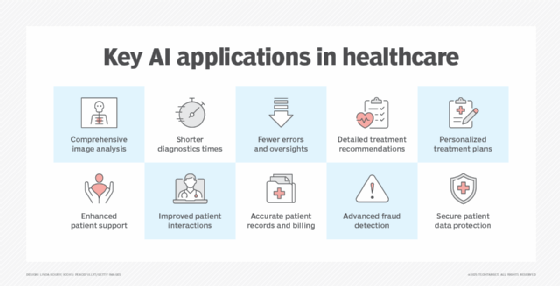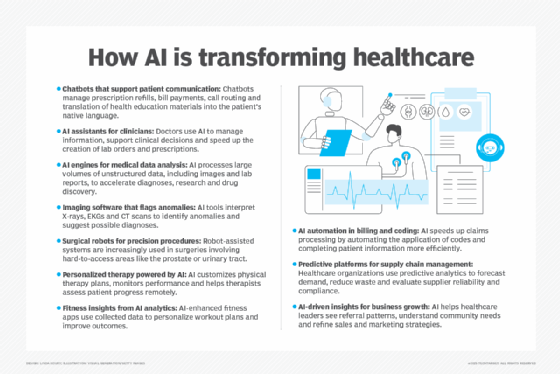10 benefits of AI in healthcare
Healthcare was one of the first and more notable industries to achieve tangible AI benefits, including image analysis, accurate diagnoses, earlier treatments and patient privacy.
Healthcare practitioners are awash in a flood of medical images, test results, patient medical records, drug interactions, and billing and administrative information. The need to ingest, relate, understand, diagnose, plan and arrive at the best patient treatments places formidable demands on even the most talented medical staff.
AI technologies are emerging to meet these healthcare challenges. AI is capable of ingesting and processing enormous volumes of data with startling speed. It also demonstrates strong analytical and predictive capabilities that can be applied to a wide range of healthcare areas, such as diagnosing illnesses and diseases, spotting potential drug interactions, recommending patient treatments and ongoing care, and predicting patient outcomes. AI plays an increasing role in patient management, drug discovery and development, and administrative processes.
Still, AI benefits in healthcare must be tempered with the following ethical, regulatory and liability concerns:
- Ethical issues involve data access and use, preventing misuse and ensuring that patient information -- especially data used to train AI systems -- is used in a transparent and responsible manner to mitigate decision-making bias while guaranteeing patient anonymity.
- Regulatory issues include data access, security and retention to ensure patient data is protected from loss, tampering and theft -- all while adhering to prevailing regulatory obligations like HIPAA.
- Liability issues center on the acceptance and trust of AI by healthcare practitioners who must have confidence in the accuracy and reliability of AI performance -- as well as the potential patient risks and liabilities involved if a practitioner acts on faulty AI advice.
How AI can benefit healthcare
AI systems are growing and finding adoption in four broad areas of healthcare: diagnostics, treatments, administration and patient experience. Given the enormous scope of these four areas, it's possible to detail an array of 10 specific benefits of artificial intelligence in healthcare.

1. Comprehensive analysis
AI can ingest and analyze enormous volumes of raw and unstructured data, including medical images like X-rays and CT scans, blood work and other fluid and tissue exam results, and provider notes as well as patient historical data like family medical history that could reveal potential health issues.
This article is part of
AI in healthcare: A guide to improving patient care with AI
2. Shortened diagnostic time
AI can recognize and alert healthcare providers to a potential disease or illness far earlier than might be possible with direct human examination. Shortening diagnostic time can lead to earlier intervention when treatments can be faster, less intrusive and less expensive -- improving overall patient care and outcomes.
3. Reduced errors and oversights
AI can double-check human diagnoses and cross-check treatments or medications against available digital records and patient profiles. This capability can vastly reduce the potential for diagnostic errors, recommend against unnecessary or ineffective treatments, and alert providers to potentially dangerous drug interactions.
4. Identification of enhanced treatments
Given effective diagnostics and knowledge of the patient's profile, AI can offer healthcare providers detailed recommendations for the most effective treatments, drugs and procedures available for the diagnosed condition. The result is a comprehensive knowledge base that's constantly updated with the latest tools and standards of care available.
5. Personalized treatment plans
Beyond direct treatments, AI can focus on specific patient test data, history and profiles to develop treatment plans tailored to the patient. These treatments can include adjusting sensitive drug dosages, implementing heart monitoring and telemetry parameters and even recommending the development of drugs compounded for the specific patient.
6. Improved patient support
AI can offer enhanced scheduling capabilities, such as chatbots that can make, change or cancel appointments and answer basic medical questions. AI can also provide interactive assistance with medical billing issues and financial obligations like copays and financing costs not covered by health insurance.
7. Better patient relationships
Healthcare providers and office staff are often so overwhelmed with work that patient interactions can suffer, making health services frustrating and disappointing for many patients. Using AI for automated transcription, for example, can provide more time for human interaction, so patients can spend more time with providers and improve these vital relationships.
8. Improved administration
AI can track procedures and apply coding with more accuracy and consistency than human medical coders, providing more accurate billing and faster, more comprehensive patient record management.
9. Healthcare fraud detection
AI predictive analysis of patient visits, records, care and billing can reveal potential instances of healthcare fraud or illegitimate activity, such as contacting multiple healthcare providers to obtain restricted pain medications.
10. Enhanced security of patient data
AI can oversee the access and use of all patient data. This capability can help ensure that only authorized users have access to patient data and that any uses of the data are conducted securely, ethically and in compliance with any prevailing regulatory obligations.

The future of AI in healthcare
AI benefits in healthcare already provide clinicians with an array of increasingly powerful analytical and predictive tools. As AI continues to advance in healthcare, look for the following developments in the future:
- Rare disease diagnoses. AI is already assisting in disease diagnoses, but rare diseases can be difficult to diagnose and easy to miss. AI can evolve to use an array of nuanced data collected from patients to recognize the potential for rare disease onsets that can lead to faster and more effective interventions.
- Disease progression. Diagnosing a condition is only the beginning of a patient's treatment journey. By adding a layer of predictive analytics around ongoing patient data as well as test and imaging results, AI can evolve to predict the rate and implications of disease progression. This advancement can help healthcare providers determine more timely and effective treatments while mitigating potential complications.
- AI-assisted procedures. AI could evolve to provide real-time collaboration and guidance to practitioners in remote locations or places where human clinicians are limited in number and expertise. AI-driven surgical robots are an extension of this potential. AI can process data from medical sensors and interpret images in video feeds from exam rooms and surgical facilities to offer detailed assessments and procedural recommendations.
- Precision medicine. As AI becomes more adept at interpreting a patient's genetic and genomic data, AI can evolve to provide detailed treatment plans specific to the patient. That could include eventually creating and manufacturing drugs crafted for the individual patient in dosages and compositions that meet the challenges of the patient's condition.
Stephen J. Bigelow, senior technology editor at Informa TechTarget, has more than 30 years of technical writing experience in the PC and technology industry.







